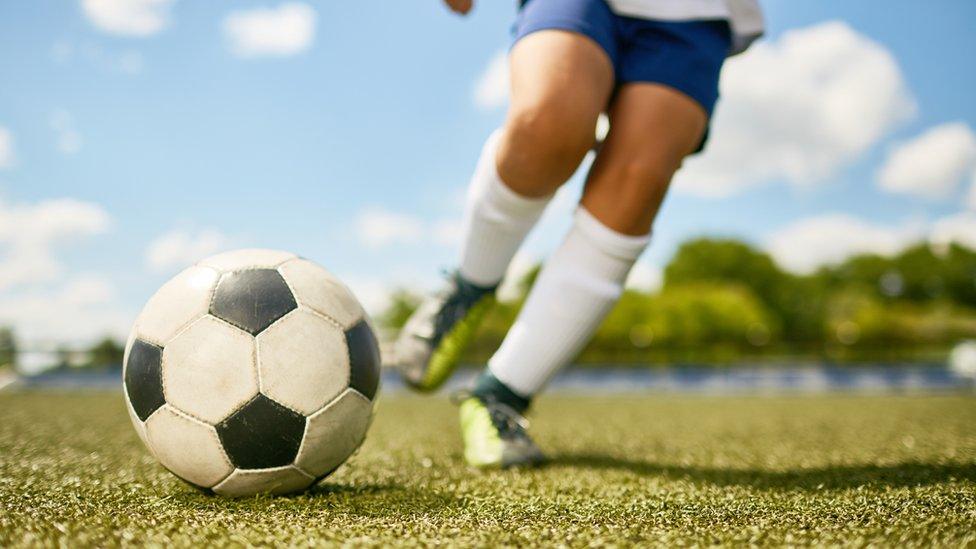Racism in football: ‘FA not doing enough to support victims of racism’
- Published
- comments
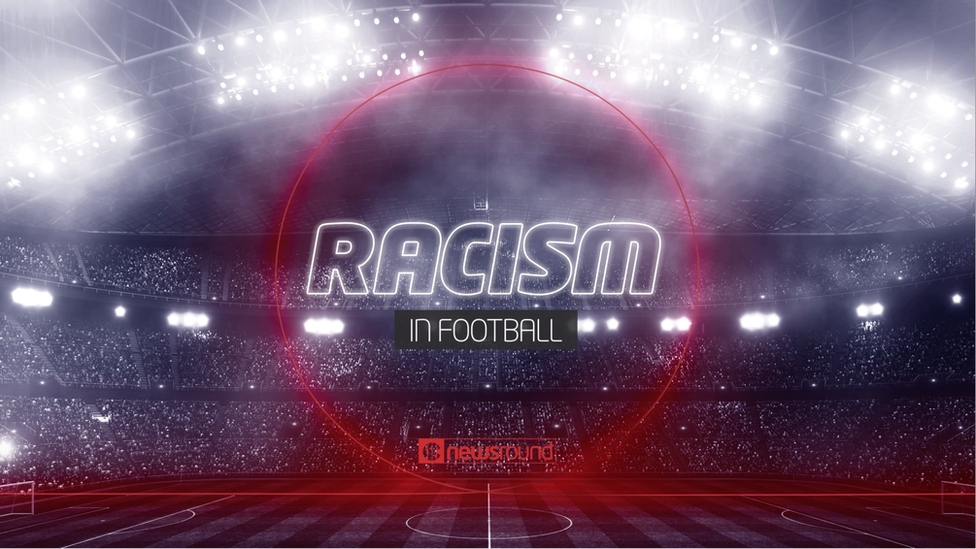
Football is the biggest sport in the world but recently it has been making headlines because of racism.
Incidents of racist abuse in English football rose last season, according to a report by anti-discrimination charity Kick It Out. But we've been told that official reports don't show the full scale of the problem.
Professional players are being subjected to racist chants, verbal abuse and trolling on social media simply because of the colour of their skin.
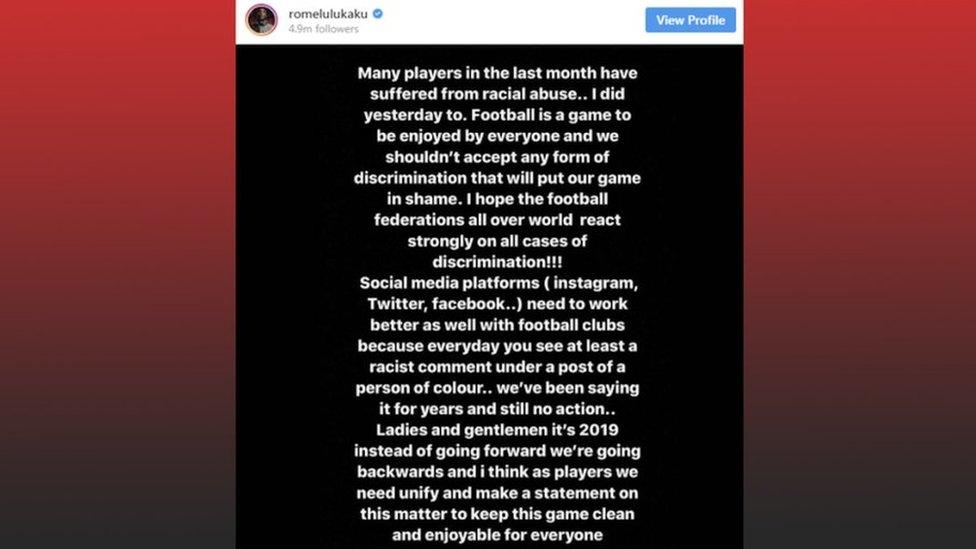
Romelu Lukaku took to social media to voice his concerns about the recent racial abuse that he and other players have faced
Recently, ex-Manchester United striker Romelu Lukaku was subject to racial abuse. He said "we are going backwards" on the issue of racism.
Other professional players - Paul Pogba, Marcus Rashford and Tammy Abraham - have also been targeted on social media.
England player Jadon Sancho said incidents of racism made him question why he played football and that he feared such abuse could make players lose their love of the sport.
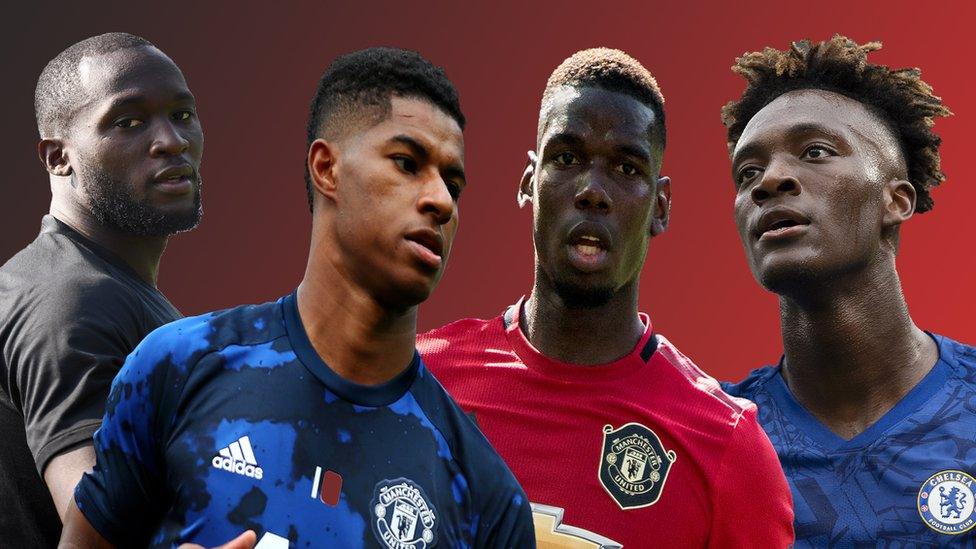
Romelu Lukaku, Marcus Rashford, Paul Pogba and Tammy Abraham have all been victims of racial abuse this season
Newsround spoke to Charlton Athletic striker Lyle Taylor, who says he has experienced racism at a professional level too.
Now players and coaches want the Football Association to take a tougher stance on the problem.
Many think the problem of racism needs to be tackled at grassroots level.
Grassroots means football played by local and youth football teams. Millions of kids and adults across the country take part in grassroots football every week.
Racism is when words or actions are used to discriminate or disadvantage people because of their colour, culture or ethnic origin.
History of racism in football
Racism in football is nothing new.
In the 1970s and 1980s racism was a huge problem. Professional black players faced mass racist chanting from large sections of the crowd and banana skins were thrown onto the pitch.
In the 1970s there were very few black or ethnic minority (BAME) players, referees, coaches or bosses in positions of power in the FA.
But nearly half a century on racism in football is still a big problem.
This year has seen a rise in racist abuse both on and off the pitch. Race and religious hate crimes have increased across England and Wales.
Former Manchester City captain Vincent Kompany thinks the lack of diversity in football organisations is part of the problem in tackling racism.
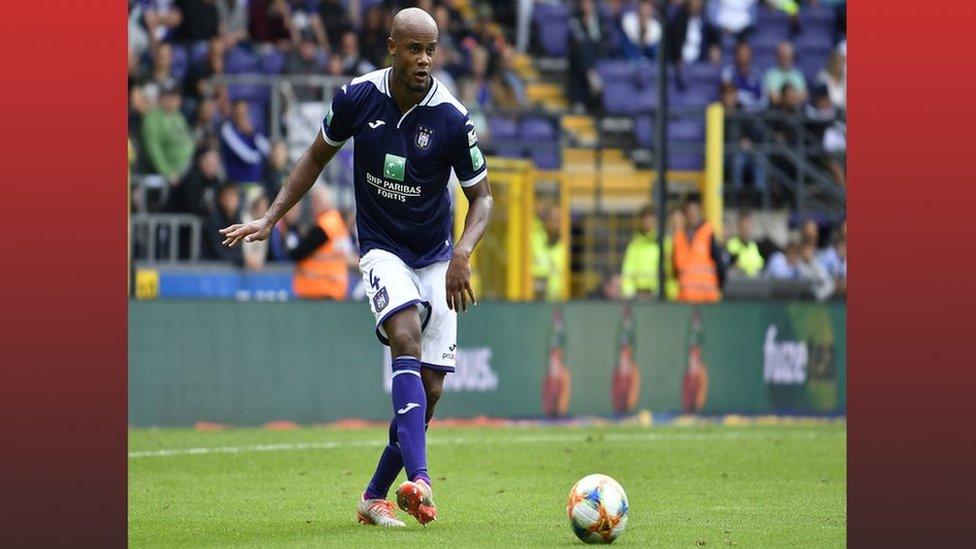
Former Manchester City captain Vincent Kompany has also suffered racist chants from fans whilst playing the game
Kompany said "That's the real issue - if you go through the boards at Uefa or Fifa, the Italian League or the English League, there is a real lack of diversity."
Viv Anderson, the first black footballer to play for England feels the same. Speaking to Newsround about the shortage of BAME coaches in the Premier League he said: "nothing's changed in 20 years".
At the start of the 2019/20 season there were only six black or minority ethnic managers in the 92 clubs in the four professional divisions, according to figures from the League Managers Association.
There is growing pressure to get more BAME managers in positions of power in football so that they can influence and change the way organisations are run.
Racism in professional football
'Racism hasn't come out of nowhere'
WATCH: 10-year-old Balraj talks to Charlton's Lyle Taylor about racism in the professional game
So what is the situation like for professional black footballers in 2019?
We went to meet Lyle Taylor, striker for Championship club Charlton Athletic and the Montserrat national team.
Lyle has spoken out about racism that he and other pro-players have received. He told us he had people calling him names in person and on social media.
He said: "I've had people sending messages and bananas...it's a bit ridiculous really, to be compared to an animal because of the colour of your skin."
The striker thinks the police and FA are "trying" but more needs to be done.
Lyle believes the only way to beat racism is to use education to tackle the root cause and to look at where and how racism starts.
Racism in grassroots football
'I'm not going to let any racists stop me playing the game I love'
WATCH: The 10-year-old boy tackling racism in football
Despite recent figures from Kick It Out showing a sharp rise in the number of reported racist incidents, many people involved in the game argue the number is much higher.
Ten-year-old Balraj is footie-mad. He experienced racism on the pitch and has been to meet people in the grassroots and professional game, as well as those in power at the FA, to find out what is being done to put a stop to it.
Racism in football: How is grassroots affected?
Millions of people play grassroots football across the country every week.
We've been to meet Imrul Gazi, who is a coach of grassroots team, Sporting Bengal.
Sporting Bengal formed in 1996 to encourage Asian football in East London and is the most successful British Asian club. But the players and coaching staff have experienced discrimination since forming.
Imrul explained that racism at grassroots level was "one hundred times more amplified" than at professional level. He said his team regularly face racism from players on other teams, referees, officials, and spectators.
'The biggest problem we have at grassroots football is education [for] parents and coaches'
In his experience, parents on the sidelines are the worst culprits in youth football.
Imrul highlights an experience five years ago when the under 12s team were subjected to extreme racist abuse from a parent of a child on the other team. The verbal abuse was so bad the coach was forced to take the kids off the pitch.
'I feel we've gone back twenty years'
Sporting Bengal's senior team recently won a racism case and a match official was charged with discrimination. For Imrul, this experience, which took over three months, was traumatic. He says it "wasn't easy" and the stress of fighting for justice will "leave a mark" on him.
Imrul feels that the FA's current reporting process for racist incidents isn't good enough and the organisation needs to do a lot more to support victims.
What is Kick It Out doing to tackle racism?
WATCH: Charities around the world are working to tackle racism in football - but are they doing enough?
Kick It Out is a charity which promotes equality in football. It works with the people in charge of football (the Football Association and County Football Associations) to try to stamp out racism, make football fairer and more inclusive.
Statistics gathered by the charity showed reports of racism in English football rose by 43%, from 192 incidents to 274 incidents, last season.
Racism was the most common form of discrimination in both professional and grassroots football.
We spoke to Tajean Hutton, who manages Kick It Out's Grassroots team.
'It's not a great situation at the moment'
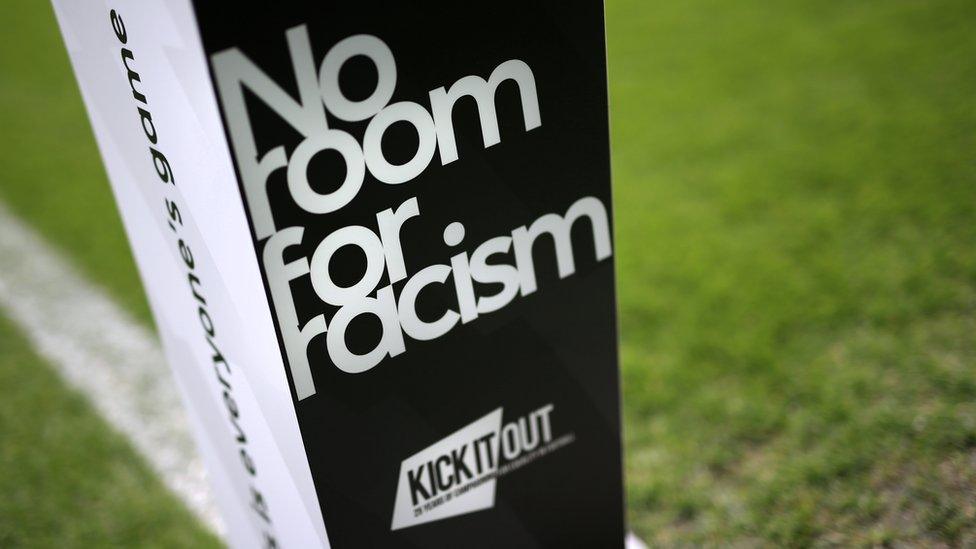
Kick It Out anti-racism adverts used at Premier League matches in 2019
Tajean believes the problem of racism is a lot worse than the charity's statistics show. He explains that there are a lot of people going through some "very bad" experiences at the moment and feels that racism "hasn't been high on the list of priorities for football".
When talking about grassroots football, Tajean said that "people have been racially abused for so long" that they've "become numb to the feeling".
Victims don't report or speak up about it because they feel "there isn't an effective method of support".
'As it stands that education doesn't exist'
Under the current system, coaches at grassroots level don't need any training about racism, discrimination, or how to report it.
To tackle the problem, Kick It Out is working to deliver new training, to help tackle racism, for coaches and refs. But this training is optional - and will remain so until the FA makes this training compulsory for all coaches.
Tajean told us they are working with fans to provide education. He said: "The same way they learn racist behaviour traits is the same way it can be reversed."
'I don't feel the FA has done enough'
When asked whether he feels the FA has done enough to support victims of racism, Tajean said "no".
For him, it will take the FA, the police, Kick It Out, and other organisations to "come together collectively" to finally rid football of racism.
'There is no one in a position of power who knows what it feels like to be racially abused'
Tajean told us that there are people in power in football who just don't see an issue of racism.
He said: "Those are the people who make the rules and until they are either replaced or their mind-set has changed, you'll find that in another 50 years it's still going to be exactly the same."
You can report a racist incident to Kick It Out through its website, app, Twitter, or over the phone. Tajean admitted that the organisation "need to find ways in which we can make reporting for kids a little bit more easy."
What is the FA doing to tackle racism?
WATCH: Racism in football: The FA's response
The FA is under a lot of pressure to address the problem at all levels of the game.
We went to meet Paul Elliot, Chair of the Inclusion Advisory Board at the FA, to find out what football's governing body are doing to prevent racism.
Paul admits that racism is a "very serious challenge" for the FA but they are working to make sure that "everyone who plays all over the country are playing in a racism-free environment".
He added that the FA are using audio and facial recognition to identify racist fans and anyone caught being racist at a game will be arrested.
Earlier this year the FA increased the minimum ban for anyone found guilty of racist abuse to six matches.
As well as racist language, the minimum ban also covers any discrimination aimed at a person's gender, sexuality, religious beliefs or disability.
Recently, Chelsea FC gave a lifetime ban to a fan who racially abused Raheem Sterling at Stamford Bridge last season. They also excluded five supporters for between one and two years for incidents at the same match.
But some have criticised this approach. Kick It Out's Tajean Hutton said "a lot of organisations will ban fans from stadiums and think that's a result, [but] people like me and you at grassroots football will still see those people with the same behaviour. So we need to [change] that behaviour."
Tajean adds: "Because football generates so much money you don't know how much you're going to lose if you present the idea that fans are going to get kicked out of stadiums.
"Once we get to grasp as a football community that the morals are more important than the money aspect […] we will find that losing fans in stadiums is a small price to pay for the integrity of the sport."
The process for reporting racism is difficult
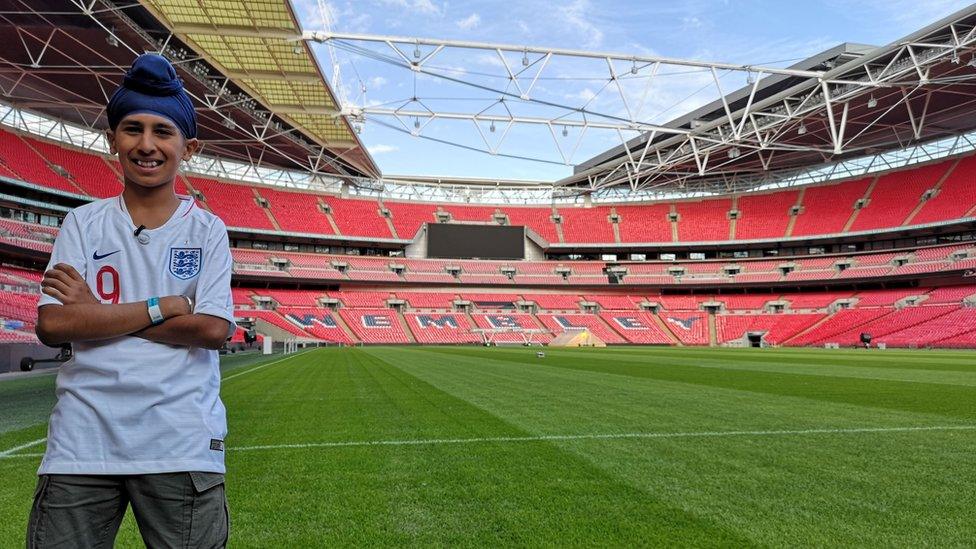
The FA has been criticised for the way it's handled racism allegations at the grassroots level of the game and for its difficult reporting process.
When Kick It Out receives a report of racism, it passes it over to the FA. Kick It Out told us that one of the main problems with the FA is that the reporting process "can take a good few months and a lot of the time the conclusion isn't in favour of the person who has made the report" and a lot of cases go unresolved.
Paul said the reporting process is "a huge challenge" and the FA is working to make the process easier.
The FA has not yet given a response to almost four out of every five of the 109 cases reported in non-professional football.
Two in five of these reports came from youth football (under-18s).
Teams will continue to be fined for walking off the pitch due to racism
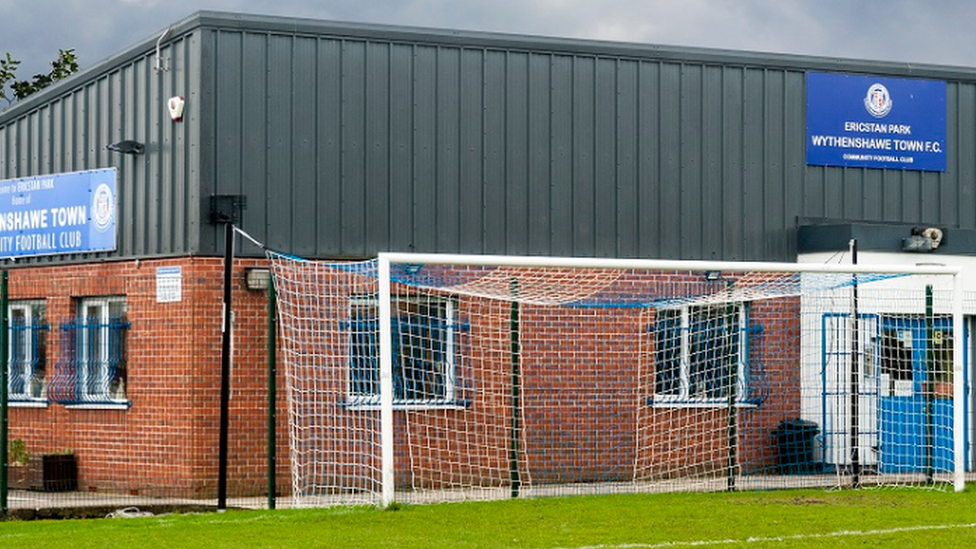
Wythenshawe Town manager James Kinsey abandoned the game after racist comments made to a player in April 2019
Teams at a grassroots level taking a stand against racist abuse also feel they have been treated unfairly. In Wythenshawe a manager was suspended for walking off in protest against abuse, and in Padiham a team was fined for walking off after fans abused racially abused their goal keeper.
When asked if it's wrong that teams are fined for standing up to racism, Paul agreed, but then told us that fines will continue and that players shouldn't walk off the pitch.
He added: "The referee has the authority to make the decision on the players behalf, then the players won't have to make that decision themselves."
But Newsround has been told of instances where coaches and refs have ignored allegations of racist abuse at grassroots level.
So what happens if the coach or ref doesn't act? How can players trust the process then?
Racism in football is going nowhere fast
The pressure is firmly on the FA to make drastic moves to improve BAME representation in the boardrooms, give more support to victims, and provide greater education for coaches at grassroots level.
This season hasn't got off to a good start - with numerous racist attacks against professional players already in the news - only time will tell whether anything will have changed by the end of it.
- Published25 August 2019
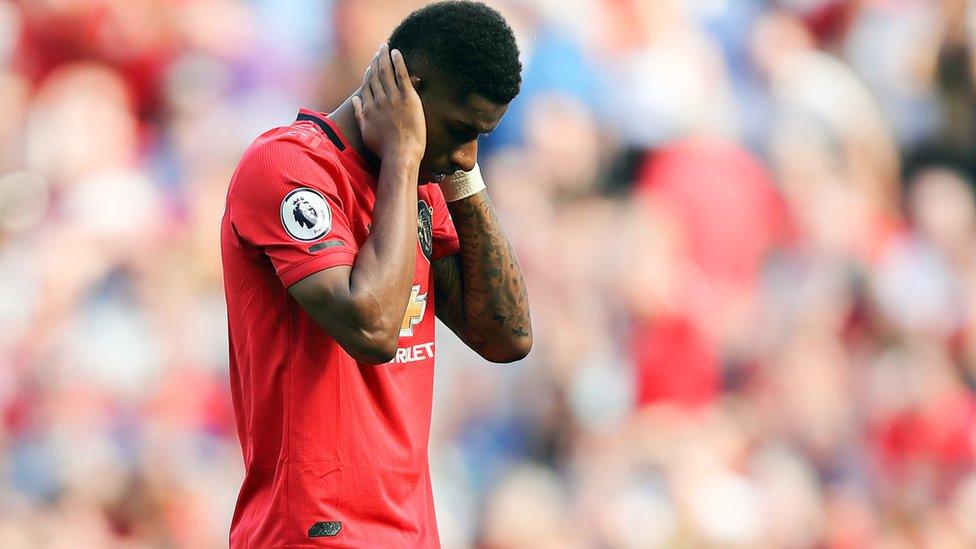
- Published1 April 2019
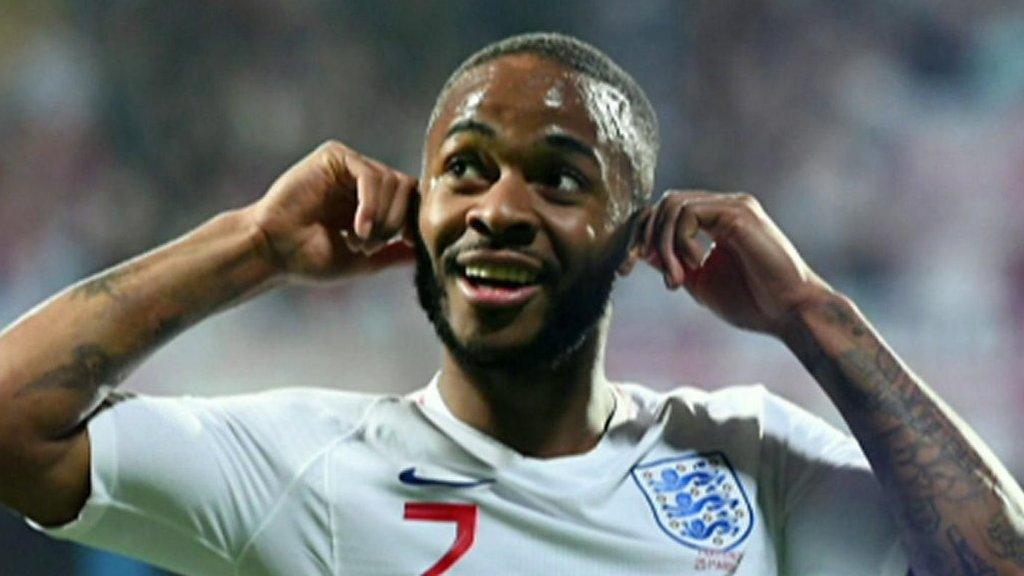
- Published25 July 2019
